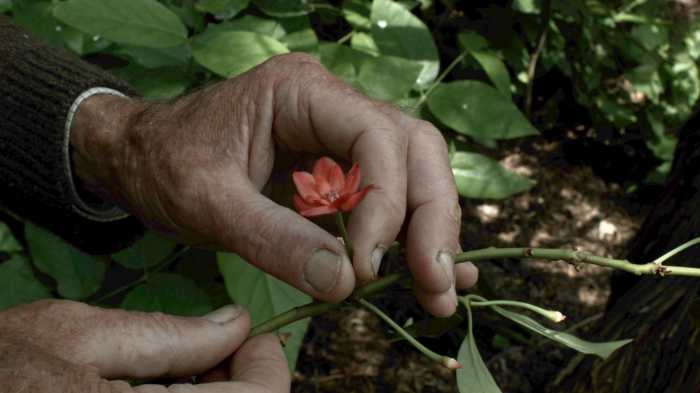Cosmina Stratan and Cristina Flutur in Cristian Mungiu’s “Beyond the Hills.” | SUNDANCE SELECTS
Romanian director Cristian Mungiu’s “Beyond the Hills” may be the first arthouse nunsploitation film ever made. It combines elements of art cinema (long takes from a stationary camera) with B-movie sensationalism and melodrama. It offers up lesbian nuns, bare breasts, and an exorcism, although it shies away from onscreen sex and violence. Simultaneously, the film provides cheap thrills and a serious examination of Romania’s primitive Orthodox churches. Mungiu serves it all up with the kind of mordant Eastern European humor that, in the final scene, sees a splash of dirty water on a windshield as a sign of doom.
“Beyond the Hills” begins in a remote Orthodox monastery in Romania. Alina (Cristina Flutur) reunites with Voichita (Cosmina Stratan) after spending some time in Germany. While the film is never entirely explicit about their level of physical passion, it’s clear the two women, who grew up in an orphanage together, are lesbian lovers. Alina wants Voichita to leave and live with her in Germany. Voichita loves the monastery and is devoted to religion, so she refuses. Alina challenges the conservative priest who oversees the monastery and gets taken to the hospital after a spell of erratic behavior. Eventually, the priest and nuns start suspecting she’s possessed by Satan. They trust in medicine enough to keep giving her pills after the hospital discharges her, but they eventually perform an exorcism on her.
Melodrama, high-mindedness mix in lesbian love story set in Romanian monastery
The Romanian New Wave continues to produce impressive work, even under an unsympathetic government. The Romanian film “Child’s Pose” recently won the top prize at the Berlin Film Festival, and its director Calin Peter Netzer took the awards ceremony as an opportunity to plead for more funding for art cinema. The Film Society of Lincoln Center’s annual series of new Romanian films, which showcased Radu Jude’s excellent “A Film For Friends” last year, is now reliant on Kickstarter for much of its funding.
However, one can understand — without sympathizing with — the Romanian government’s ambivalence about much of the nation’s recent cinema. It’s received an unprecedented level of international acclaim, while covering subjects like abortion, drugs, suicide, and Romania’s decrepit health care system. Not exactly the kind of material to entice tourists to Bucharest!
“Beyond the Hills” was partially produced by the Dardenne brothers, but Lars von Trier is the filmmaker whose work it most resembles. In fact, I can picture it as a natural follow-up to his 1996 breakthrough “Breaking the Waves,” even though the two are very different films. Mungiu rarely moves the camera, while von Trier used abrasive handheld camera and quick editing. Mungiu only does so when his characters are particularly excited. Both films, however, tell outlandish melodramas in a naturalist style, relying on the acting to make their increasingly bizarre narratives believable.
The performances in “Beyond the Hills,” which was inspired by two “nonfiction novels” from journalist Tatiana Niculescu Bran, are all credible. The characters start out seeming like ordinary people and slowly become more outrageous, so one can understand why they might think some of their stranger notions are good ideas.
Unlike von Trier, Mungiu is no misogynist. In fact, he might even be a feminist. Although “Beyond the Hills” doesn’t make a big deal out of being a lesbian love story, it is one nonetheless. Yet, it clearly doesn’t see Alina’s sexuality as the most interesting thing about her. She simply lives in a society that has no place for such a troubled woman. Her foster parents barely tolerate her. Alina’s journey to Germany had not worked out; from the way she talks about it, one suspects her story that she worked as a waitress is a euphemism for something more precarious, like sex work. The hospital kicks her out because they don’t have enough space, and the monastery insists she become a nun if she wants to stay. But Alina only wants to stick around the monastery so she can remain with Voichita, who’s so committed to religion she can’t imagine leaving to be with Alina.
Mungiu’s previous film “4 Months, 3 Weeks and 2 Days” was paced like a thriller. Despite its off-putting subject matter — a woman seeking an illegal abortion under Romania’s former Communist regime — it won the top prize at Cannes in 2007 and was a minor arthouse hit in the US the following year. At 150 relatively slow minutes, “Beyond the Hills” is a much heavier slog. I suspect it might not have received US distribution at all were it not the follow-up to “4 Months, 3 Weeks and 2 Days.”
Still, “Beyond the Hills” shows a canny synthesis of the arthouse and whatever’s left of the grindhouse. Let’s hope Mungiu resists the temptation to come to Hollywood and make “The Last Exorcism 3.”
BEYOND THE HILLS | Directed by Cristian Mungiu | Sundance Selects | In Romanian with English subtitles | Opens Mar. 8 | IFC Center | 323 Sixth Ave. at W. Third St. | ifccenter.com



































